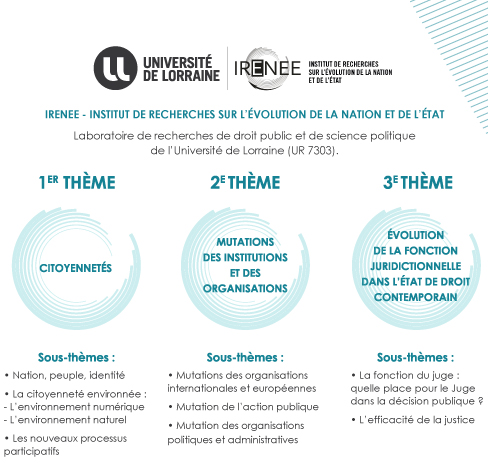Presentation of the research project
The 2018–2022 scientific project - which is the reason for being of IRENEE - is based on the study of the notion of state and nation. It adapts to the ongoing judicial and political news.
It definitely takes into account a current scientific issue which always starts again and this leads to new questions to be answered. This scientific project is part of a strategic approach to highlight the IRENEE inside the University of Lorraine and in its regional and cross-border environment.
Three main topics have been chosen, following a multidisciplinary approach. They are part of the IRENEE's basic structure which is based on the State-Nation mutation, as well in political science as in public law..
Citizenships Topic
This topic relies on the study of contemporary state in relation with its human foundation. It materializes into sub topics:
- Nation, people, identity: It is about deepening the targeting on the demotic question ; indeed, contemporary issues require the constitutional dialectics of the nation and the people to be renewed;
- The new stakes of citizenship: It is about analyzing citizenship, at an international and European level, seems to question its traditional link to nationality. It leads to a kind of post-national citizenship, whose normative potential is particularly interesting to be studied;
- The new participatory processes: It is about questionning the new way for democracy to express itself, which results in citizenship being transformed in a renewed environment.
The mutation of institutions and organizations topic
This topic relies on major changes affecting the relationships that State – Nations have both with other sovereign entities and with private players which express their interests inside or outside them. It materializes into sub topics:
- The mutation of international and European organizations: New more flexible and punctual structures or alliances as well as high reluctancy to deeply cooperate at an institutional level appear;
- The mutation of public action: New frameworks and new means of actions define themselves at an internal level ; and this, both in order to take into account a relevant scale which is not national anymore, but European and even international, and to increasingly associate private interests to how policies and public services are carried out and managed;
- The mutation of political and administrative policies: The private / public relationship reorganizes itself : it also affects the way the political action is represented and carried out, which can be expressed outside political parties ; or it leads to renewing how party leaders are selected..
This topic is highlighted by the University of Lorraine in the field of humanities in the framework of the "Contrat de Plan Etat-Region" (contract between the state and the region) ; it was seized by IRENEE, because it corresponds to its own scientific research.
The topic of the Evolution of the jurisdictional function in the contemporary rule of law
This topic relies on confirming the rule of law and protecting fundamental rights. These are striking features of how European states have evolved and mostly of how judges currently control the decisions and regulation of social relations. The suggested topic thus aims at interpreting the notion of jurisdictional function, as well in the different areas of social activities as in how efficient justice is. It materializes into sub topics:
- The judge’s function: what role does the judge play in the pubic decision ? This role is critically questionned. It raises questions about the expert’s position facing the policital powerlessness, the notion of separation of powers or even the normative sovereignity;
- The efficiency of justice: It is evaluated through a technical dimension this time, using jurisdictional procedures and the judge’s decisions.
This topic shows how human potential is renewed at IRENEE. It is also more specifically part of a partnership between the Institute and the administrative jurisdictions in the Grand Est region, among which the "Cour Administrative d’Appel" and the "Tribunal Administratif de Nancy". Indeed, seminars are now regulary organized with these jurisdictions.


